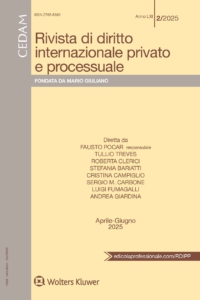Views
The Dubai Supreme Court on Indirect Jurisdiction – A Ray of Clarity after a Long Fog of Uncertainty?
I. Introduction
It is widely acknowledged that the recognition and enforcement of foreign judgments depend, first and foremost, on whether the foreign court issuing the judgment was competent to hear the dispute (see Béligh Elbalti, “The Jurisdiction of Foreign Courts and the Enforcement of Their Judgments in Tunisia: A Need for Reconsideration”, 8 Journal of Private International Law 2 (2012) 199). This is often referred to as “indirect jurisdiction,” a term generally attributed to the renowned French scholar Bartin. (For more on the life and work of this influential figure, see Samuel Fulli-Lemaire, “Bartin, Etienne”, in J. Basedow et al. (eds.), Encyclopedia of Private International Law – Vol. I (2017) 151.)
Delhi High Court Grants Rare Anti-Enforcement Injunction: Implications for International Disputes
By Ananya Bhargava, Jindal Global Law School, OP Jindal Global University, India.
Recently, the Delhi High Court in the case of Honasa Consumer Limited v RSM General Trading LLC granted an anti-enforcement injunction against the execution proceedings instituted in the Dubai Court on the ground that it threatened the arbitral process in India. The Court deemed the proceedings before the Dubai Court as an attempt to frustrate a possible arbitration envisaged by the contract between the parties. The injunction was granted under S.9 of the Indian Arbitration and Conciliation Act 1996 as an “interim measure.” This is a significant turning point in the intersection of arbitration and cross-border litigation in India since the remedy of anti-enforcement injunction is rarely granted by judicial authorities across jurisdictions.
How many monetary judgments that Chinese courts decided to enforce are successfully enforced?
It is necessary to distinguish (1) a court’s decision to acknowledge the validity of a foreign judgment (judgment recognition and enforcement), and (1) whether a judgment creditor successfully recovers the awarded amount in practice.
News
Call for Papers: 4th APILA Conference, Doshisha University (Kyoto, Japan), 13–14 December 2025
The fourth annual APILA Conference will take place in person at Doshisha University in Kyoto (Japan) on Saturday 13 (Day 1) and Sunday 14 (Day 2) December 2025. The APILA Conference will be in the form of two days of roundtable discussions in English. Persons whose abstracts have been selected (see next paragraph) will deliver oral presentations in turn on Days 1 and 2. Each presentation will run for about 10 minutes and be followed by a discussion of about 10 to 15 minutes in which participants will have the opportunity to comment on the presentation. The objective of the APILA Conference is to assist presenters to refine prospective research papers with a view to eventual publication. Read more
Rivista di diritto internazionale privato e processuale (RDIPP) No 2/2025: Abstracts
 With a slight delay – entirely due to myself – I am pleased to announce the release of the second 2025 issue of the Rivista di diritto internazionale privato e processuale (RDIPP, published by CEDAM). This issue features:
With a slight delay – entirely due to myself – I am pleased to announce the release of the second 2025 issue of the Rivista di diritto internazionale privato e processuale (RDIPP, published by CEDAM). This issue features:
Francesco Pesce, Associate Professor at the University of Genoa, Il riconoscimento delle decisioni straniere in materia civile tra previsioni sulla competenza funzionale del giudice interno e comunicazioni alla Commissione europea (Recognition of Foreign Decisions in Civil Matters between Provisions on the Functional Jurisdiction of National Courts and Communications to the European Commission; in Italian) Read more
Virtual Workshop (in English) on September 2, 2025: Eva Lein on “PIL and dispute resolution in times of crisis”

On Tuesday, September 2, 2025, the Hamburg Max Planck Institute will host its monthly virtual workshop Current Research in Private International Law at 11:00 a.m. – 12:30 p.m. (CEST). Professor Eva Lein (Lausanne University) will speak, in English, about the topic
“PIL and dispute resolution in times of crisis”
In times of polycrisis, the law is put to the challenge. In international commercial transactions the question is how law can safeguard commercial activity, avoid a plethora of disputes, and encourage a pragmatic legal environment conducive to global economic recovery. This contribution discusses how dispute settlement mechanisms and private international law can be used to responsibly manage disputes in this context and to appropriately respond to future crises.
The presentation will be followed by open discussion. All are welcome. More information and sign-up here.
If you want to be invited to these events in the future, please write to veranstaltungen@mpipriv.de.



